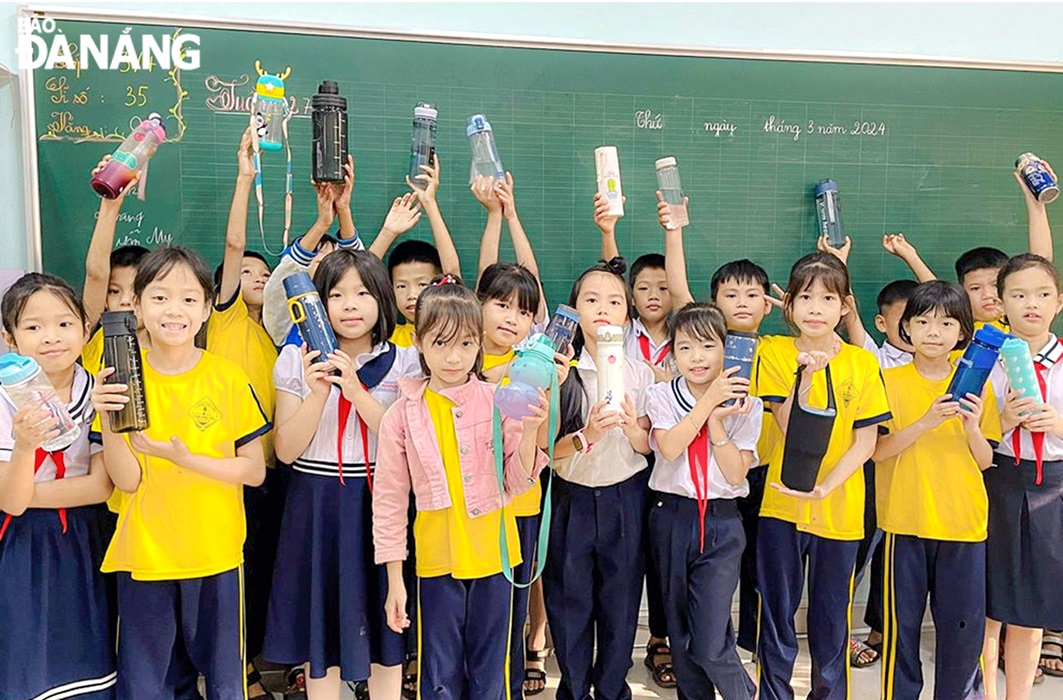Ten years ago, Da Nang initiated the construction of green school model at the primary school level, but the implementation of the model was not consistent. In the 2023-2024 academic year, 20 primary and junior high schools in districts of Hai Chau, Lien Chieu, Cam Le, Ngu Hanh Son and Hoa Vang have piloted the "Green Schools Reducing Waste" model, with the aim of expanding this initiative citywide.

More than 50% of pupils from these pilot schools use reusable personal water bottles. Photo: Chien Thang
The "Green Schools Reducing Waste" model is part of the "Clean Cities, Blue Ocean" (CCBO) programme, funded by the U.S. Agency for International Development (USAID) through Tetra Tech (ARD, INC). The Da Nang Department of Natural Resources and Environment, in coordination with the municipal Department of Education and Training and the Live&Learn, has piloted the model in 20 schools to create a green, clean, and friendly learning environment.
The initiative aims to foster a future generation that lives harmoniously and responsibly with the environment, contributing to building an environmentally friendly city. This pilot also aligns with the goal of having 100% of schools sorting waste at the source by 2025.
After one academic year, there were 65 school events and 2,042 lessons related to the "Green Schools Reducing Waste" model. Over 1,200 teachers were educated on the model, whilst 24,000 students increased their environmental awareness. More than 11.7 tonnes of waste were sorted, processed, or transferred to collection units, including 700 kilos of plastic waste. These activities have significantly raised pupils' awareness of environmental protection and waste management.
Teacher Tran Thi Hien from the Pham Hong Thai Primary School noted that waste sorting, recycling, and reuse activities have helped pupils understand these processes, reduce waste, and stimulate their green thinking.
Also, schools have taken the initiative to compost food waste for school garden use, teaching students practical planting skills and enhancing their environmental protection skills.
Pupil Tran Nguyen Hieu Hanh from the Phan Phu Tien Primary School mentioned using waste materials like ice cream sticks, plastic tubes, and cups to create toys and educational models. Participation in the school's environmental club has instilled a sense of responsibility and developed good habits, such as using food waste for compost, using personal water bottles, and minimising plastic bag use.
The "Green Schools Reducing Waste" model also involves developing activities and plans to raise environmental awareness and responsibility among pupils.
The Le Hong Phong Junior High School, for example, has implemented rules to reduce plastic waste, communicated these to all teachers and students, and encouraged parental cooperation.
The school has upgraded facilities to support the model, replacing single-use products like plastic cups, bottles, and bags with environmentally friendly, reusable items. It has installed water filtration systems instead of plastic water containers, labeled recycling bins, monitored waste production, and organised events like plastic-free soccer games and waste-reducing food festivals.
The city’s Department of Natural Resources and Environment emphasised that integrating environmental protection into the education system was crucial for building an environmentally friendly city. The goal is for all schools to implement waste sorting at the source by 2025. The CCBO programme's pilot at 20 primary and junior high schools in various districts has yielded significant results. Based on this, stakeholders will refine the criteria for green schools reducing waste, applying them across all educational levels citywide to effectively integrate environmental education into schools and cultivate an environmentally responsible future generation.
Reporting by Chien Thang - Translating by Truc Vy